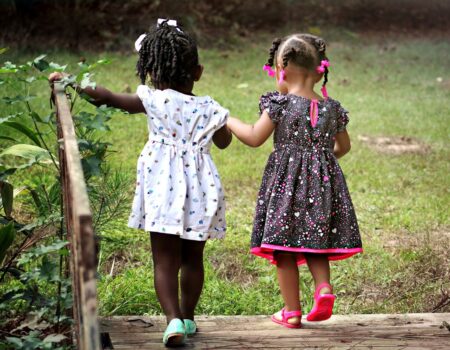Because at midday Sori is a furnace, shortly after relocating back here, I adopted the small habit of enjoying the breeze while sitting under the neem tree in front of my house. From there, leaning against the tree, I could see the path leading down to the market, the rusty tin roofs of the market buildings, and beyond all that, Nam Lolwe, still and shimmering under the unrelenting heat.
On Tuesday noon, Mama walked up the path, her big kikapu balanced on her head, her leso draped around her shoulders, tattered bata slippers billowing dust with her every step. When she neared the shade, I expected her to put the kikapu down and rest. She didn’t sit down. She stood there, towering over me. And so, I covered my temple with my right palm.
Then she spoke, thirst and tiredness weighed her words. ‘I have arranged for you to marry.’
My hand dropped from my temple to reveal a fresh bruise. I looked up and watched as a strange expression creased Mama’s face, possibly disgusted. At that moment, self-conscious of the bruise on my face, I felt a stupid urge to hide from her. The immense silence of this place at midday, when heat forces inactivity on everything, rushed in to fill the distance between Mama’s standing frame and my slouched body. Her eyes remained fixed on me; I thought she was going to interrogate me. I returned my hand to my face.
‘Her name is Fina. Fina Ojwangi. Myself, I’ve never seen her in church. But I’ve talked with her mother and I’m sure she will be good for you.’
Again, the silence. And with her figure looming over me like that, I felt she expected me to say something. The hand I covered my face with began to get tired and also, I became aware of my groaning stomach. I moved my tongue around my mouth and felt stale traces of vomit. Then I tried but couldn’t recall how I had managed to find my way home.
‘What do you have that you want to say about this arrangement?’
There is only one Ojwangi in the entire Sori, and he is a pastor. That stern, giant of a man who patrols this bleak place of heat and dust, a smug smile on his hideous face as if he is God’s personal assistant, and is always ready to force a bible verse and unsolicited advice on everyone he meets. I was sure that man wouldn’t allow his daughter to be married off like that. I don’t know what gesture or expression I made, but when Mama spoke again there was irritation in her voice.
‘Ogina, you went to Mama Andiwo again!’
For a moment I thought she was going to berate me, tell me how I was soiling my father’s name, how every time my name was mentioned in her presence, she felt like hiding under the table, and how there was nothing Jesus couldn’t forgive or help me go through. Instead, she continued with a calm that surprised me.
‘I know this is not how you thought things would be, but now that they are like this, this is what your father would have wanted, and done.’
The tenderness in her voice stirred the memory of the night I returned home after almost ten years. On seeing me, dejected, standing there at the doorstep —the flickering paraffin tin lamp on the table illuminating my tattered clothes, and behind me the solid blackness of the night— she had gasped, ‘Oh, nyathina —my child!’
I had to say something. Staring at the ground between my scrawny legs, I managed to stammer my concerns about what this Fina girl would eat, considering that I’m not in a position to support myself, let alone another person. Uttering the first words, feeling my breath become fresher the more I opened and closed my mouth, my self-consciousness slipping away, and jumbled emotions giving way to concrete thoughts; these things urged me on and I talked some more. Until I heard myself shout that I, too, was aware of what a failed investment my life had turned. That I had accepted the fate of my life fizzling out to nothing; there was no point in marrying, bringing somebody’s daughter to this misery. That nothing bothered me anymore, least of all what her Jesus can do, or what the dead —a father who was never really a father— would have done.
I was now standing, fists clenched and legs shaking. White gunk and spittle dotted Mama’s dark face. Sometimes, when I recall the hurt that was in her eyes and my inability to think of anything else to say to her, I cry. At that moment, standing face to face with the woman who I had always thought was tall like Pastor Ojwangi, I noticed the faded, frayed leso and remembered the time from my childhood when its pattern of flowers —orange petals and white stalks— set against a deep blue background and the writing ‘Huba Inaondoa Unyonge —Love Removes Misery’ were still visible. I felt strange, realising that Mama still had that leso with her everywhere she went, either draped over her shoulder or tied around the waist: When going to the market to sell fish; when opening the barn gate for goats and their rope tangles her feet, almost toppling her; when preparing a meal and the burning twigs fill the tiny hut with smoke.
Mama didn’t say anything after my outburst. She trudged on to the main house, both her hands maintaining the balance of the kikapu on her head. The passing years had subdued her, something that even father’s beatings could never achieve. With her gone, I was relieved to slouch back against the tree, and gaze out at the lake.
That evening, I was at home when the goats came from the fields. I guided them into the barn and closed the gate. We ate supper together, in the silence of the sooty paraffin tin lamp. I even stayed late enough to join Mama for her evening prayer. It felt strange to kneel, and to hear Mama’s voice, really-really hear her laden voice; her thoughts unravelling in prayer. When I got tired of wondering when she would stop talking, I tried to will my heart to believe. I shut my eyes tighter, pressed my knees harder on the mud floor, forced my mind to recall the simple faith I had in childhood. But all I could grasp was pitch darkness. My eyes hurt from the strain so I opened them and looked around the house —everything, from the wooden furniture to the mud walls, covered in a lace linen yellowed with dust— until, at last, it was time for ‘amen’. I said it with a bit of enthusiasm and glanced at Mama, expecting that sharing a moment of prayer would have pleased her.
It’s true, most of the time I am over at Mama Andiwo. But honestly, I hate dim, packed, musty rooms. I hate rowdy people. Almost everyone in Sori, sober or drunk, is in a way rowdy. And most of all, I hate the sharp smell and the bitter taste of that drink.
When I was young, I used to feel this immense power within me. Perhaps because my Christian background instilled in me a sense of a predetermined life, I somehow translated this feeling to mean that like Christ and all those impressive bible characters, a great destiny awaited me in adulthood. I never bothered myself with the exact outlines of this destiny. I felt it in my gut, I was sure I would grow up to be somebody. I cruised through primary and secondary school and Mama was just so happy, she gladly sacrificed all that she was to take me to the university.
Nowhere more than the lakeside, on the sunny Sunday mornings I accompanied Mama to help with washing clothes and utensils, did I feel this power bubbling inside me. Even now, somewhere in this foggy mind, I can still see myself, barefooted and clothed only in ragged shorts, standing in front of that vast water body. If such an awe-inspiring thing existed, I must have reasoned, oh, the possibilities of what I could be! And so, sometimes I used to raise a stick, and for a few seconds believe that I had parted the waters. Other times, I would step slowly into the lake and momentarily feel that I was walking on it. Those short moments by the lake, moments now buried beneath years of listlessness and despair, are all the true happiness I’ve ever known.
The following day, Wednesday —or was it Thursday?— we prayed together again. And on Friday, yesterday, when Mama returned from the market and found I had swept and arranged the house, done the dishes and split firewood, warmth crept back into her features. She greeted me, ‘Oimore,’ and with that one word of greeting, the wall that had separated us instantly crumbled down, heaping bricks at our feet.
‘Eh, at least today I can rest early.’ She said, after taking in all that I had done around the house.
Mama could not control her happiness. It was there in her voice, in her face, in her movements. She poured water into a sufuria and said, ‘I can’t remember the last time I used utensils I didn’t wash myself.’ She picked a log, fed it to the fire, and while watching it burn, she said absent-mindedly, ‘Just see how fire eats it well.’ Then she laughed, a sudden burst of mirth, and with laughter like butter lubricating her words, she added, ‘Thoo, God is good! Today let my chest rest from that bitter smoke.’ I was sitting on the floor beside Mama, fire crackling as it devoured the dry wood, leaping flames causing our shadows to dance on the wall behind us.
‘You know, the work of one person hindered Ochola from carrying out his plans of burning a school.’ Mama retold a story she used to tell me when I was young, about a recluse named Ochola who wanted to burn down a school just for the sake of it. In the evening, he prepared everything. The petrol, the matchbox, and a secure access point he would use to enter the school compound. Midnight came, he sneaked in and poured petrol through the classrooms. But by the time he finished all sixteen classes —it was a primary school with two streams per class— he was exhausted and decided to rest for a while. And that was how the next morning they found Ochola, snoring on a desk, the matchbox clasped in his hand.
Somewhere in the warmth of that evening, she even mentioned that it was okay if getting something to do with my life had refused me; I could just stay here in Sori and help around the house and with the fish business. What was not okay and what she could not accept, she threw a mischievous glance at me, was my inability to seduce a lady. Haven’t I heard the story of the cripple who snatched a chief’s wife in West Alego? I laughed with her, but we were conscious of the heaps of bricks at our feet. Mama reverted to an old story. Again, another one she used to tell me when I was young, about how she and her brothers would put stinging nettle leaves upstream, then hide in the shrubs and watch with stifled, body-shaking laughter as those who were bathing downstream scampered out of the water while contorting their bodies, their two hands not quick enough to scratch the back, the belly, the thighs, the buttocks.
When the conversation wandered into the heap of bricks, and every piece of brick we tried to unturn, untangle, felt excruciatingly heavy, she glanced at me and retreated to her old stories, or the wrangles of her fellow fishmongers, or village gossip. At the end of the night when I left for my house after prayers, Mama said, ‘Sleep well, nyathina.’
‘You too, Ma.’ I responded and stepped out into the night breeze.
In the morning, persistent pounding at my door woke me. I was on the floor; shirtless and barefoot. I tried to move my limbs, but they felt heavy. It was as if I had been laid out on a cross but instead of nails, my hands and feet were pinned down by boulders. Then, a thudding headache. Then, something irritating the insides of my nose. Then, the taste of vomit. The night before, I thought I would never be back there, not that soon, not ever. My tongue darted over my lips and tasted the crusted gunk. The irritation in my nose made my eyes watery; I snorted in and swallowed the chunks.
‘Ogina!’ Mama called, followed by two soft knocks. An image of the hurt in her eyes if she were to see me like that entered my mind. I sat up. A searing pain shot from my right thigh. Something had torn my trousers and slashed the skin.
‘Ogina?’
Wincing, I tried to mumble a response.
‘Eh! You are in? Er… I thought…’ In her brief pause, I took in the sight of my shabby room. In one corner, an intrusion of cockroaches was darting between plates, stopping momentarily to nibble on rotten food remains. In the other corner, a flimsy wooden bed —the only furniture in that single room— heaped with soiled clothes. Next to me, a patch of the mud floor soaked in vomit and urine. Mama’s voice reached me. ‘It would make me happy if today you accompanied me to church.’
I made a sound.
‘I have left a bible for you on the table, next to your breakfast. Carry it with you when you come. Main sermon usually starts around eleven.’
I made another sound. Mama walked away. As the click of her slippers, muffled by the thick dust, became fainter and fainter, I closed my eyes and saw the leso draped around her shoulders. It looked like a cape, and it was as new and colourful as it had been when I was young.
For a long time, I remained on the floor, eyes shut, feet stretched out, and my arms propped behind me. The sun gathered strength; the crack and pop of the tin roof got louder. Soon, the heat was stifling. And like clockwork, my parched and panting body craved the shade of the neem tree where, at that time of day, it usually enjoyed the breeze. But I did not move. I wanted to feel everything: the desolation, the pain from the thigh wound, the hunger knotting my intestines, the weight of Mama’s love for a worthless, miserable son like me. I opened my heart and took it all in. I felt streaks of warmth on my cheeks.
‘I must go swimming.’ I mumbled and, sniffling, began to drag myself up.
*
Here at the shore, it seems the lake and the sun are locked in a struggle: the breeze negating the heat. This arouses a strange sensation. I know the sun is in the sky but I can’t feel its fieriness. The shoreline is bustling with activity; some people are washing, some are bathing, others are fetching water. All around, it seems, fathers and mothers, ladies and men, girls and boys, share work and laughter and play. Here on the open shore, the sun is powerless. I remove my slippers and step into the water, slowly, one foot after the other. When the water reaches my thigh and covers my wound with its coolness, something like giddiness tugs at my heart. Now the water is at my navel. Now my chest. And now, at last, I am submerged. I feel weightless.
Then, suddenly, it’s evening. But not the evening of today, because in my mind there is a blank stretch of time behind me. I’m sitting in a luxurious reed chair under the neem tree, enjoying the still, soft atmosphere. The aroma of wet fried tilapia, accompanied by clunky music of the utensils, drifts from my house. It feels like I’ve been here in Sori for a while, and I’ve helped Ma build a thriving fish business.
‘Osiepa!’ A sweet voice comes from inside the house.
‘Yes. Talk to me, Osiepa.’ I call back.
‘It’s time for you to go down the market and help Ma close up.’
‘Ah, it’s already time!’
‘Yes. And after, come right home, you hear? Supper is almost ready.’
‘Haha, how will I ever convince you that Mama Andiwo’s disgusts me?’
‘Cross your forehead and point at the sky. The tell me one more time.’ A playfulness in her voice.
‘Alright, done. Now, first, you know I can never miss your finger-licking meals. Second, you know your company is all the happiness I need. Third… Is there need for a third?’
‘Haha, go to your mother, you crafty man. Go and help Ma, the night will cover us soon.’
I push my head out of the water and gasp for breath. I wipe my face with my palm, blink rapidly and then open my eyes. My stomach groans. I remember the breakfast waiting for me. And the bible. Somewhere in that book, there is something about it not being okay for a man to be alone. I will look up the verse and read it to Mama.
The water before me is endless. It laps against my chest and I feel it’s gentle power.
Dismas Okombo
Dismas Okombo is a short fiction writer and poet based in Nairobi, Kenya. His writing has appeared in Brittle Paper, The Kalahari Review, and African Writer Magazine. He’s @adisojr on X (fka Twitter) and Instagram. He is @writerdismas on Facebook.





